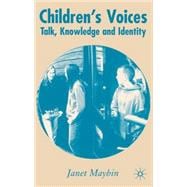
| Acknowledgements | |
| Transcription Conventions | |
| Introduction | |
| Focussing on the Margins | |
| Conceptualising Voice and Meaning-making | |
| Outline of the Chapters | |
| Setting the Scene | |
| Shifting the Lens | |
| The Researcher in the Data | |
| From Context to Contextualisation | |
| From Dialogue to Dialogicality | |
| Evaluation, Socialisation and Identity | |
| Towards a More Dynamic Language of Description | |
| Context, Genre and Frames | |
| Switching Contexts | |
| The Generic Production of Meaning | |
| The Intertextual Construction of the Present | |
| Microcontexts: Manipulating Frames | |
| Conclusion | |
| Dialogue and Collaboration: Girls and Boys | |
| The Duet of Friendship | |
| Producing Unformalised Knowledge in Group Talk | |
| Gender, Communicative Style and Identity | |
| Conclusion | |
| Reported Voices and Evaluation | |
| Representing Voices: Grammatical and other Cues | |
| Invoking and Evaluating People | |
| Recreating Events | |
| Evaluation in Projected Speech and Reported Thought | |
| Conclusion | |
| Articulating Dialogue: Agency and Gender in Children's Anecdotes | |
| Representing Experience and Exploring the Self | |
| Three Levels of Narrative Meaning | |
| Indexicalisation and Dialogic Relationships | |
| Conclusion | |
| Narrative Reflections and Moral Complexities | |
| Articulating Moral Stances | |
| Beleaguered Positions | |
| Divided Loyalties | |
| Conclusion | |
| Schooled Voices | |
| A Framework for Understanding Reproduced Voices | |
| Repetition and Appropriation in Teacher-Pupil Dialogue | |
| Reproducing Authoritative Voices: Appropriation and Styling | |
| Framing Work and Play | |
| Conclusion | |
| Official and Unofficial Literacies | |
| Official Literacy: Power, Procedure and Product | |
| Hybrid Practices | |
| Unofficial Literacy | |
| Personal Writing: Identity and Regulation | |
| Conclusion | |
| Conclusion | |
| Notes | |
| References | |
| Index | |
| Acknowledgements | |
| Transcription Conventions | |
| Introduction | |
| Focussing on the Margins | |
| Conceptualising Voice and Meaning-making | |
| Outline of the Chapters | |
| Setting the Scene | |
| Shifting the Lens | |
| The Researcher in the Data | |
| From Context to Contextualisation | |
| From Dialogue to Dialogicality | |
| Evaluation, Socialisation and Identity | |
| Towards a More Dynamic Language of Description | |
| Context, Genre and Frames | |
| Switching Contexts | |
| The Generic Production of Meaning | |
| The Intertextual Construction of the Present | |
| Microcontexts: Manipulating Frames | |
| Conclusion | |
| Dialogue and Collaboration: Girls and Boys | |
| The Duet of Friendship | |
| Producing Unformalised Knowledge in Group Talk | |
| Gender, Communicative Style and Identity | |
| Conclusion | |
| Reported Voices and Evaluation | |
| Representing Voices: Grammatical and other Cues | |
| Invoking and Evaluating People | |
| Recreating Events | |
| Evaluation in Projected Speech and Reported Thought | |
| Conclusion | |
| Articulating Dialogue: Agency and Gender in Children's Anecdotes | |
| Representing Experience and Exploring the Self | |
| Three Levels of Narrative Meaning | |
| Indexicalisation and Dialogic Relationships | |
| Conclusion | |
| Narrative Reflections and Moral Complexities | |
| Articulating Moral Stances | |
| Beleaguered Positions | |
| Divided Loyalties | |
| Conclusion | |
| Schooled Voices | |
| A Framework for Understanding Reproduced Voices | |
| Repetition and Appropriation in Teacher-Pupil Dialogue | |
| Reproducing Authoritative Voices: Appropriation and Styling | |
| Framing Work and Play | |
| Conclusion | |
| Official and Unofficial Literacies | |
| Official Literacy: Power, Procedure and Product | |
| Hybrid Practices | |
| Unofficial Literacy | |
| Personal Writing: Identity and Regulation | |
| Conclusion | |
| Conclusion | |
| Notes | |
| References | |
| Index | |
| Table of Contents provided by Publisher. All Rights Reserved. |
The New copy of this book will include any supplemental materials advertised. Please check the title of the book to determine if it should include any access cards, study guides, lab manuals, CDs, etc.
The Used, Rental and eBook copies of this book are not guaranteed to include any supplemental materials. Typically, only the book itself is included. This is true even if the title states it includes any access cards, study guides, lab manuals, CDs, etc.